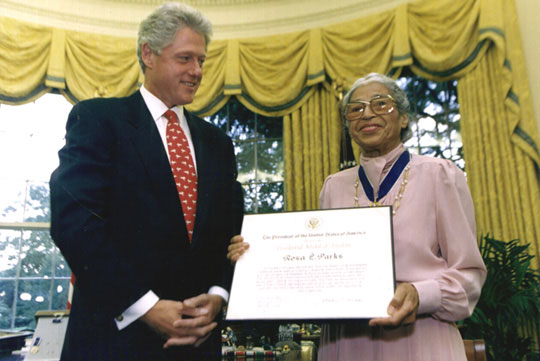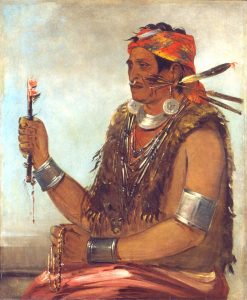Winner of the Fall 2017 StMU History Media Award for
Best Article in the Category of “Social History”
Rosa Parks, a strong, independent Civil Rights Activist, stood up for what she believed in. She’s known for her courageous acts dealing with the Montgomery Bus Boycott and the early phase of the Civil Rights Movement in the 1950s. But what happened in her life after these important events?
As we know, Rosa Parks was arrested for not giving up her seat on a Montgomery bus in 1955. She entered the bus, saw that it was quite crowded with one seat available located in the front “Whites Only” section of the bus. As more passengers boarded the bus, the bus driver demanded that he needed the seat Rosa was sitting in. She refused, and she was arrested.1

After her arrest on that December 1, 1955, Edgar Nixon, another Civil Rights Activist, paid her one-hundred-dollar bond. Immediately following her bail, she proceeded to file a lawsuit against the National City Lines bus company for its segregation practices. After weeks and weeks of this being an active case, the judges finally concluded. The court ruled bus segregation to be unconstitutional. The year-long Montgomery Bus Boycott finally came to a victorious end in Alabama in December 1956.2 During the boycott, Parks was invited by the United Auto Workers Union (UAW) to come to Detroit to speak to the union’s members. Local members of the UAW even raised the money to bring Rosa in. She stayed at the Garfield Hotel because blacks were not allowed to enter or reside at any downtown hotels. The mayor of the suburb of Dearborn had made his views on segregation clear: “Negroes can’t get in here. . . These people are so anti-colored, much more than you in Alabama.”3 Rosa Parks speech about the Montgomery boycott had a great impact on the UAW membership in Detroit.
Rosa Parks became an icon of the Civil Rights Movement. Her leadership skills and perseverance led to multiple doors opened for her, although at first she and her husband found getting employment difficult. In 1957, Rosa Parks moved to Detroit where her brother Sylvester lived. In 1964, Parks helped John Conyers campaign for Congressman, fighting for “jobs, justice, and peace” for Michigan’s first Congressional District. Certain laws prohibited some of Detroit’s residents from voting. Rosa was able to help Conyers win the election by obtaining the help of Martin Luther King. With King’s endorsement, Conyers won by a margin of 84%. Conyers then hired Rosa Parks as his secretary and receptionist, a position she held until 1988. Her daily tasks included dealing with issues such as, education, housing, and segregation.4

The Detroit that Rosa Parks moved to in 1957 was highly segregated. After World War II, Virginia Park, the historic district of Detroit where Parks lived, had become overcrowded, like many other sections of Detroit where African Americans were restricted. The district was further disrupted by the building of a highway, requiring the relocation of 43,000 citizens of Detroit, 70% of whom were African American. This led to increased frustration by Detroit’s African-American population, who were denied access to Detroit’s suburb housing, but told that Detroit was “colorblind” when it came to housing discrimination.5 When blacks attempted to move into the white suburban areas, realtors discouraged them and banks were very hesitant to make housing loans to them. If they succeeded, violence typically followed. By 1963, black citizens began to protest these closed housing practices. On June 23, 1963, Rosa Parks and Martin Luther King joined to lead Detroit’s Great March to Freedom to protest these unfair housing practices. This march drew a crowd over 200,000 people.6
Rosa also recognized that inner-city black students in Detroit, as elsewhere, didn’t receive the kind of preparation in their public schools to go to college. Growing up, Rosa herself barely had the opportunity to attend school, let alone college. With the assistance of Representative John Conyers, she raised government funds to open the Rosa L. Parks Scholarship Foundation. This Foundation gives Michigan high school seniors the opportunity to pursue a college education when they exemplify the ideals of demonstrating academic skills, community involvement, and economic need. This has been very beneficial for hundreds of students from poor Michigan communities since its founding in 1980. Although the process of creating this scholarship was very rigorous, Rosa was able to accomplish this goal.2
On October 24, 2005, Rosa Parks died from natural causes. She is still recognized to this day for her courageous acts.8
- Julie Bosman, Once A Stop for Rosa Parks (New York: The New York Times, 2016), 2-3. ↵
- Julie Bosman, Once A Stop for Rosa Parks (New York: The New York Times, 2016), 2-3. ↵
- Jeanne Theoharis, “The Northern promised Land that wasn’t: Rosa Parks and the Black Freedom struggle in Detroit,” OAH Magazine of History Vol. 26 No. 1 (2012): 23-24. ↵
- Jeanne Theoharis, “The Northern promised Land that wasn’t: Rosa Parks and the Black Freedom struggle in Detroit,” OAH Magazine of History Vol. 26 No. 1 (2012): 22-25. ↵
- Jeanne Theoharis, “The Northern promised Land that wasn’t: Rosa Parks and the Black Freedom struggle in Detroit,” OAH Magazine of History Vol. 26 No. 1 (2012): 24. ↵
- Jeanne Theoharis, “The Northern promised Land that wasn’t: Rosa Parks and the Black Freedom struggle in Detroit,” OAH Magazine of History Vol. 26 No. 1 (2012): 24. ↵
- Julie Bosman, Once A Stop for Rosa Parks (New York: The New York Times, 2016), 2-3. ↵
- Brinkley Douglas, Rosa Parks: A Penguin Life (New York: Penguin Books, 2000), 27-35. ↵



53 comments
Alexandria Martinez
This was an interesting article, most of the stories that I have heard about Rosa Parks is just that she refused to give up her seat and got arrested for it. However, I didn’t know all of the things that she did after those events. She is truly an inspiration to many, she is someone who everyone should look up to and aspire to be more like.
Michael Mandujano
Rosa Parks was a major contribution in the Civil Rights Movement, because of her boycott on a Montgomery Bus. Parks was a brave-women, considering she knew she would be jailed for not giving up her seat. In fact, the strict segregation laws that were enforced were immoral, especially for forcing African Americans to give up their seats when using public transportation. Overall, this article was well-structure and enjoyable to read.
Josselyn Arrieta-Meraz
The story of Rosa Parks will forever be one of those stories you grow up listening to and will continue to tell no matter how old you are, this women is such an important part of the Civil Rights history in the United States that her legacy continues to reach the hearts and minds of those who quite don’t understand what African Americans had o go through at the time. She teaches a very valuable lesson, she simply spoke and stood up for what she believed in.
Edith De Loera
I have heard the courageous story of Rosa Parks many, many times before, but still, it is a story that I will truly never get tired of hearing. Rosa lived through the difficult hardships that came with being a colored female back then, but also used her great passion to make a great impact on society right after. After the bus incident, Parks’ life changed completely, and I very much admire how you showed that side of the story for a change.
Megan Barnett
I believe you made a good connection with the reader during your introduction and following paragraph as you addressed us in a very informal and friendly way. A lot of information on parks was included within your article that I had never heard of before, for example that she lead Detroit’s Great March to Freedom with King and that she raised funds to open up her own scholarship foundation.
Carlos Aparicio
Rosa Parks is one of the first women in history to stand up for what she believes in. She is amazing for the brave acts she has done. As a Civil Rights activist, she stood up against the segregation laws peacefully, which makes her mature. While others violently riot, she disagreed with respect. I did know she actually continued to fight peacefully after the bus situation. I really liked this article because it explains what Ms. Parks action were after she was wrongfully imprisoned.
Maria Callejas
Very good introduction, you give a very clear explanation of what you will talk about. Rosa Park’s immensely brave objection stands as one of the most historic moments of America. What I find great about your article is that although you briefly mention the Bus incident, you don’t stop there. You talk about Rosa Park’s life after that, which is something not many now. How her personal crusade towards the end of segregation would fill the rest of her life. Even joining forces with MLK. Overall, great work!
Ashley Tumlinson
Great article! Rosa Parks is an outstanding historical figure that is still brought up, and will be brought up for a great deal of time in the future. This article definitely gave Rosa Parks life throughout all the specific and deep detail! Most people just know of what she did but not what happened after and I loved that type of approach that you took! You made it known that even though she had, what at the time seemed like a minor setback, she was able to live life greatly after.
Clarissa Bustamante
Great Article! Rosa Parks was such an inspirational person. She spoke up for what she believed in no matter the consequences. But she really did make a change which resulted in the people in this world to come together. This article did a very great job in using the right wording to allow the reader to find out how Rosa Parks felt in the situation she was in and also how people felt about her. I think that it was great for the writer to write from the position of what happened after the incident and not just about what happened.
Teresa Valdez
Many times in history we remember a person based on a single act they perform. That is certainly the case with Rosa Parks. So this article covers a great topic. I would have never known that Parks worked to end segregation of communities of the North, or that Detroit was more prejudiced than Alabama. This article is well written and covers the later work of Parks well.